#Also guess who started playing psmd
Explore tagged Tumblr posts
Text
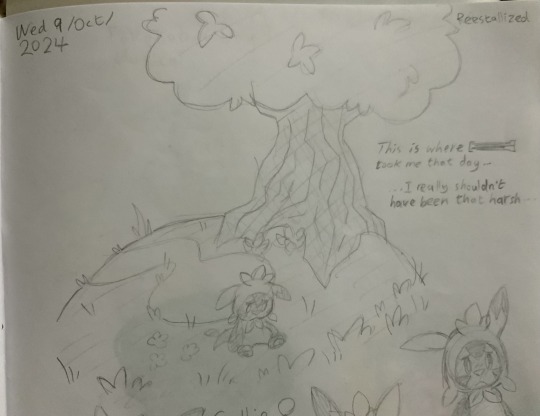
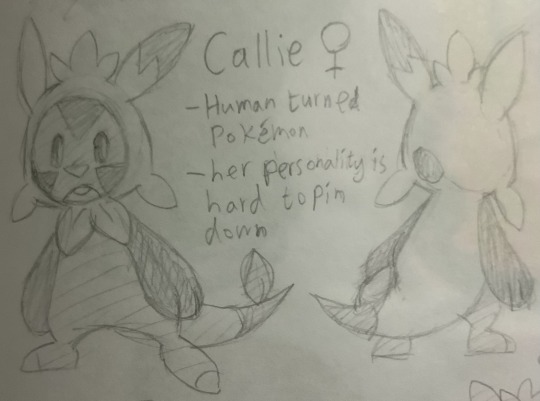
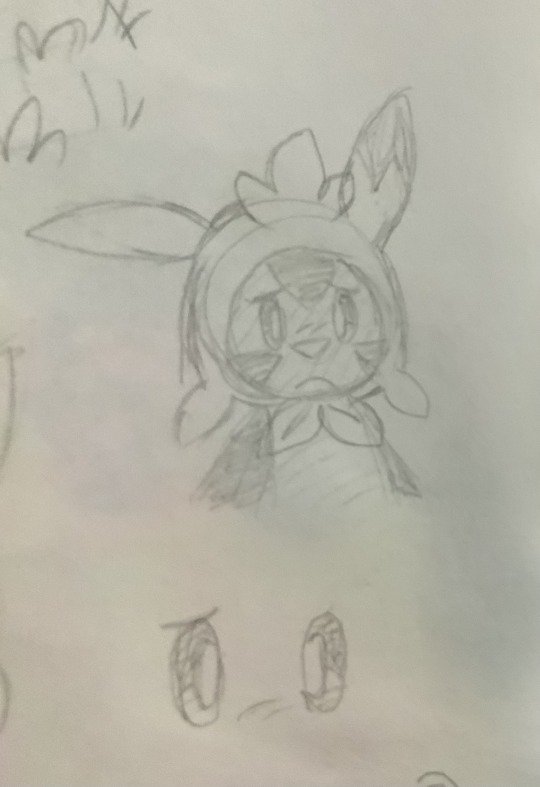
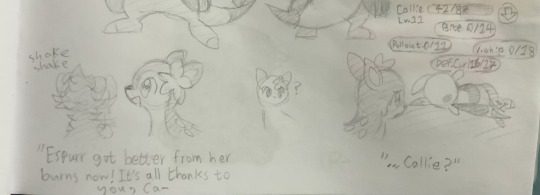
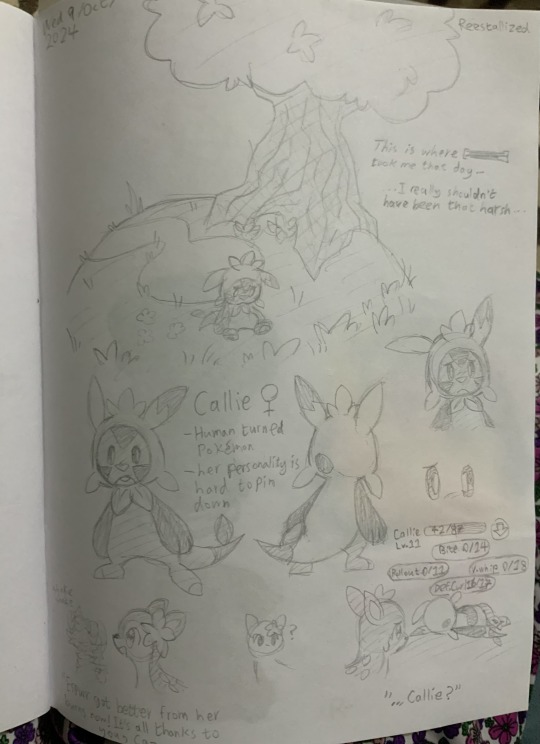
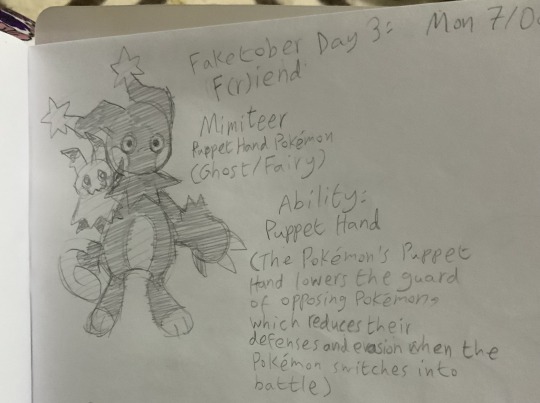
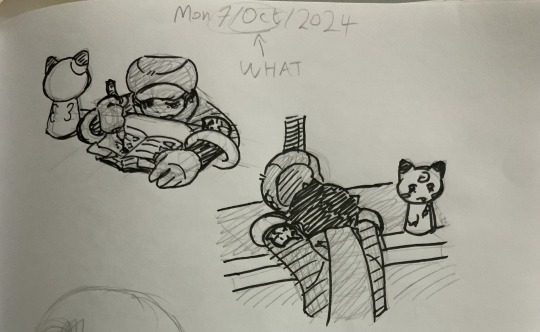
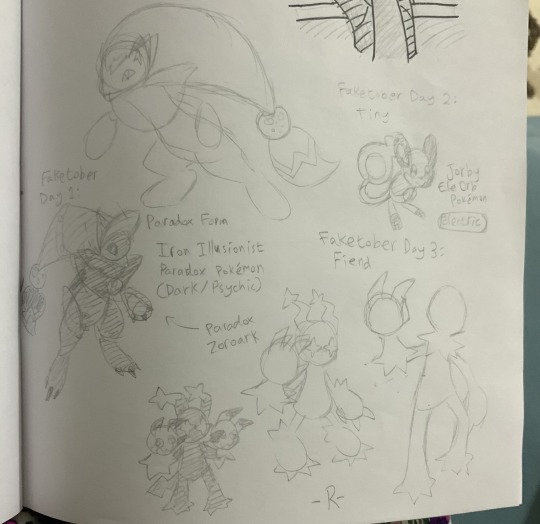
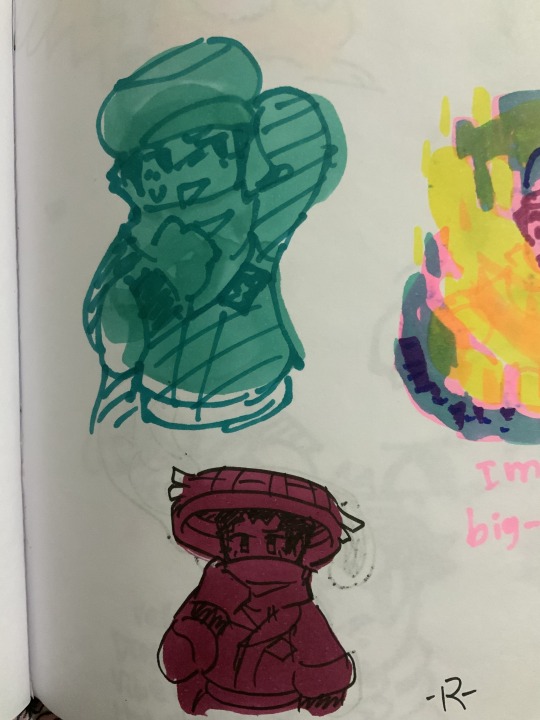
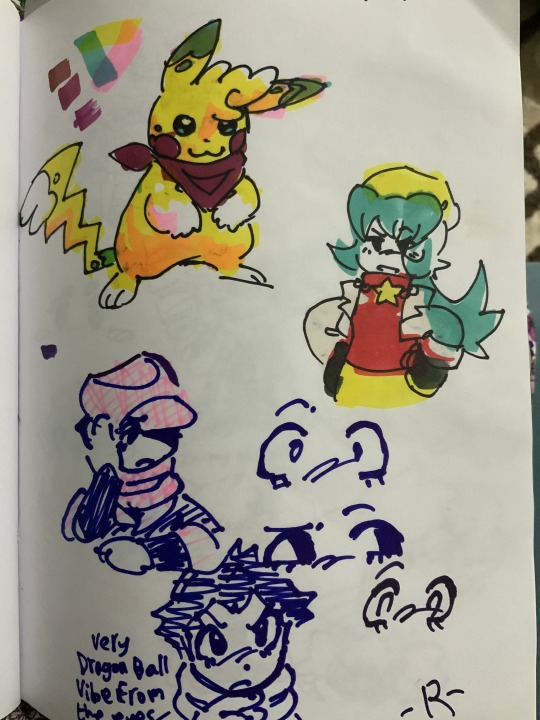
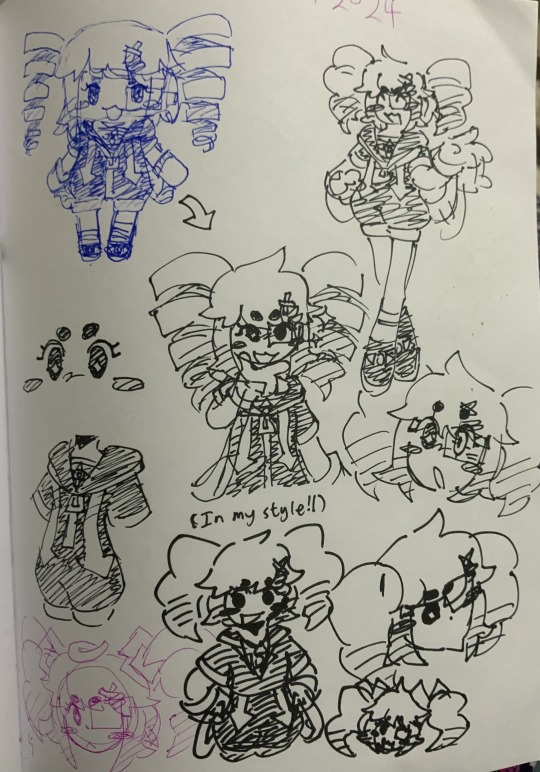
Sketchbook dump be upon ye
#Also guess who started playing psmd#pokemon#reestallized drew this#reestal likes to draw#pokemon fanart#pokemon protagonist#pokemon mystery dungeon#pokemon legends arceus#pokemon super mystery dungeon#I saw the girl in the last one on some Chinese board game box cover and I really liked her design so. I drew her
14 notes
·
View notes
Note
How about 4 and/or 7 for the pmd ask thing? :3
Woo, first time I’m taking a crack at this so do expect scuffedness ahead, but let’s see what I can do!
What did you name your hero and partner characters? And why?
In most of my main PMD playthroughs, I would often stick to my main name and go with a default nickname that would come in my head because my younger self was very by-the-numbers, and my existing copies still have my irl name on there as it felt similar to the RPG spirit when I played games like Skyrim and KOTOR, before eventually then settling down on the OC names I got below. I guess I begin giving the rundown of all my OC names, starting with my first PMD game.
Super:
Cormac is based on my irl self, so he shares my name as I thought it would help for immersion, but looking more into it and I realised that my name has a lot of meanings like “son of the raven” and “legendary charioteer”. However, there was one meaning out of pure random spite that I happened to look up and my name had a relation to “tree trunk”, which immediately made me think to the Tree of Life and its role in the story. Whilst the hero’s background as a warrior who fought Dark Matter felt honestly really cool to have as that’s my own first name, my take on his character being that he grows vengeful to those around him and being angsty and very self-doubtful also goes to how it can relate to “corruption”, which I would eventually imagine as the reason why he has his scar over the right eye.
Sprout came from my partner in PSMD in my one and only playthrough of the game which was just simply Bulbasaur and “Bulbs” in Rescue Team DX, before I eventually went with it due to the cabbage dino having a plant on his back (he’s such a dork) and how he sprouted as being a kindred spirit into the reincarnation of Mew that he’s known as today.
Explorers:
Harmony (Explorers Hero) is what I’d like to have if I eventually get around to playing and beating EOS via emulator, but in my mind he would become the deuteragonist of my PSMD fanfic that I think I probably want to rewrite at some point so I have a clear goal in mind where I’d like to take it. His name is supposed to be irony due to Cormac’s only existing harmony scarf and his species as a Riolu of being able to sense aura, but I wanna write the both of them being a one-sided into a temporary two-sided rivalry before they become equal and shared friends.
Flurr (Explorers Partner) essentially begins the trend of being trying to think of a name for the characters as I was unsure of where I wanted to go from the main three I had in my mind, but I guess her name came from Zelda and the “Flurry Rush” ability Link is able to perform in the games, and her rapid nature to attend to Harmony’s ever-increasing sass is what lead me to I think picking her name. She’s also my only female partner character so my mind went “AWWWWW YEAH, HERO X PARTNER TIME” and headcanon flurrfy comments were born. These two goofballs I gotta draw, and also I NEED to draw Flurr’s design, I do wanna imagine what she looks like <3
Gates:
Cormos is again based on my irl name but the last two letters are changed, but he’s my hero and he’s a Tepig. Tepig was the first Pokémon I ever used in any Pokémon game for a starter due to a leant copy I got from one of my older stepbrothers and the rest is history. His name I eventually decided to go with on an as-of-yet started playthrough of KOTOR 2.
Tusk (Gates Partner) came from one of the Club Penguin villain characters you find as the main antagonist of Card-Jitsu Snow and I loooovvveeed playing that as a kid. Often I’d spent upwards of tens of hours playing the parties and virtual worlds and the fact that Tusk is an Axew makes it so much better as it’s as close to a walrus-like creature you can get from the game’s available starters XD
Rescue Team:
Scrald and Planker (Torchic and Totodile Hero and Partners) only came to my head when I wanted to try writing a story prompt for the Hero and Partner week that took place earlier in the year, and because my canon playthrough simply just used my irl name and Bulbs from an OC PMD team I made aggggeeesss ago, those two names popped into my head and they’d eventually stick. Scrald’s name is based on what I imagine is his firey personality, often liking flamed berries and getting very flustered whenever someone tries to help in or puts their confidence in him, often flailing his feathers about without a basic care in the world XD Planker came from the snapping jaws he has when he too gobbles up food, so if they ever went to the Expedition Society or Wigglytuff’s Guild, the two would probably compete in food completions to see if one of them could outlast the other by one-upping them.
Spoiler alert: they both fail.
A lot.
But on the plus side, come the fugitives arc, Scrald (when not eating) becomes the most insecure fire type one has ever laid eyes upon. I like to imagine it much like Harmony that since his name sounds like the move “Scald”, that he’d be feeling warm on the inside whilst they travel to see Ninetails. Only it’s more like “Screw this!” and it being cold. Poor hero has it tough in those games, and that’s where his personality is based on. Planker is more of a blank slate for me, so eventually I’d like to flesh him out, but my brain go brrrrrr
How do you interpret the future trios relationships to each other?
I think all of them ship each other and Dusknoir and Grovyle have something called B E I N G G A Y when special episode 5 comes around, whilst Celebi is being mischievous pink cabbage gremlin with the time travel abilities to play ring-a-ring-a-rosies with the funny ghost man and has to endure his 6+ long hour cardio session of flying around before his Sableye lackeys can even do a thing. If I’m gonna be perfectly honest, seeing yours, Scribz’s and some other people’s perceptions of the future trio have permanently altered my brain to not see them as nothing more than three peas in a squished pod and you can’t change my mind, they’re all poly-coded and love each other that much.
That took a while to write lmao, but thank you for the ask!
3 notes
·
View notes
Text
Okay, so I finished the post-game (or at least, the parts of it I actually care about i.e plot and talking to characters to see their reactions), and am ready to give my final thoughts on the experience.
It was very fun, over all, and I liked it a lot. I didn’t feel as much of a personal connection as I did with Explorers, but that didn’t really take anything away from the experience. The overall plot I think was…. simpler, in some ways? Less complex, at least, despite the heavy topics. And I think it was shorter over all? I didn’t do a dungeon count comparison, but it seemed like it was shorter. Well, the “fugitive arc” seemed longer, I suppose, but that’s probably because it was slightly more complex in what was actually happening. Like—there was a bit of lead up to in where you technically weren’t a fugitive, but the circumstances surrounding the whole thing made it seem like you were away from home longer as far as gameplay went.
…I mean, I think that the original fugitive arc from Rescue Team was probably longer in terms of dungeons visited during it and implications given via the narration, but unlike other games in the series I’m pretty sure that was the only period where you didn’t have access to the hub for a major stretch of time, whereas other games had more times where you would have to be solely focused on your deposit box/Kangskhan statues and picking up stuff in the dungeons. …And, okay, you could cheat a little in Gates with Companion Mode, but in a way that just added to the feeling of how long the hero was gone, since it takes pains to make it clear this is a side-story type deal—that this is what everyone was up to back home while the main plot was happening. Which could then either add to or shorten the duration of the gameplay, depending on how much time you spent there.
Overall characterization I think was better here, although I don’t think that the partner, specifically, went through as much character growth as in other games? Like… they very clearly pointed out in Explorers at different points how much the partner had grown and changed, and there were also points like that in PSMD, but in Gates it wasn’t entirely clear? Like, there were some points where the partner talked about what their life used to be like… but it isn’t as though you actually saw that in-game. While it was clear to see friendships growing over time, and the growth in terms of acceptance of the hero eventually having to leave was clear… their attitude as far as the hero was concerned kind of seemed more static from day one? Like—the closeness was evident, it’s just that it basically went from zero to a hundred upon first meeting them and then just stayed there. I think there was more growth from the player’s end of things in regards to the partner.
And the Rescue Team partner was just very, very bland in general. There was a little growth during the fugitive arc—sort of—but… honestly, they didn’t add that much beyond being a way to provide exposition. Especially with how much they didn’t matter come post-game.
And I still feel like there was something weird with how Paradise and Post Town were treated. At some points it felt like your Paradise supporters were the closest to you and should have mattered more… but at other times there was a lot of focus on the Post Town inhabitants, and Paradise didn’t come into the equation. Which was especially jarring in the ending, where I think it was only the Timburrs who came to the party—and aren’t really treated as Paradise inhabitants, for the most part, though they would occasionally show up there—and yet Gurdurr’s response to the hero’s return was to break down in tears and need the screen to fade to black for a bit (which was actually extremely sweet). I think that the “travelers” to Post Town actually had more characterization than the people who were really inhabitants—bar the shopkeepers, who, as always, had reactions and some of them actually had little subplots of their own—which was… strange, considering how important they all supposedly were when it came to fighting the Bittercold. (And, like, I don’t really get why they chose Scraggy to be the move tutor. Considering Azumarill was just pulled randomly out of nowhere, I don’t see why they couldn’t have done the same thing with him. Or, hey—just made Quagsire the move tutor and let Azumarill do both the request board and party editing. Or leave the party editing up to you doing it yourself right before entering a dungeon—as when you were taking the magnagate paths—or having you go around Paradise and talking to individual pokemon, similar to how you did it in Rescue Team. …Though that admittedly probably would have gotten very annoying very quickly).
It was very cool, however, that you actually had to work to get the hero back. That it wasn’t just given to you like in Rescue Team or Explorers, and that everyone made a genuine effort and tried to think about what was best for hero, too. … And also that it was something I actually cared about, whereas in PSMD I felt like it was… half desperation for their own circumstances, rather than necessarily because they genuinely missed the partner? I mean—yeah, that’s kind of harsh, because it was clear that they were genuinely good friends, but… well, as in the tone of my other complaints about how the player got screwed over in that game, the partner was really their only tie to their actual past, and even then it was a tenuous one. So… I just didn’t care as much, I guess. …Also probably the fact that it was a lot simpler/more linear process and took less time to get the hero back in Gates. So… yeah, you had to work for it, and the work was satisfying, but it was also a short enough process that you wouldn’t get bored or frustrated during the duration.
The choice of what to make a cutscene and what to just keep as narration during specific plot points was also a little odd at times—I would have enjoyed to actually get to see a bit of the welcome back party after the initial glacier exploration, for example, and maybe even seeing you help building your house. (On that note—it was a cool little detail to see grass starting to grow around your house as the game went on.)
I think the gameplay mechanics were overall an improvement in Gates—though I do miss the IQ abilities just because of how rare it was to actually find team skills. It seemed more luck-based than anything, which does provide a challenge and leads to replay ability since it would lead to a different experience each time, but…. I don’t know, I just liked the other method better. It was nice to actually be able to utilize my recruits and see their growth, as well as getting to actually play as them and utilize different strategies in Companion Mode… but that also highlighted just how bad the AI and certain choices they made as far as attacking/not getting separated from the group were in comparison to how I remember the other games going.
I think as far as total experience with gameplay, mechanics, and story goes that I still like Explorers more—because it does feel like more of a challenge, after all, and that each new accomplishment, shop, or special episode that gets unlocked was due to your general efforts and hard work. Like it is a genuine reward, rather than something that just got handed to you. And the progression was clearer to see and made more sense than in Rescue Team.
So I guess my new order for favorite games in the series is: Explorers, Gates, Rescue Team, PSMD.
…I think I hit all the highlights, but I’m sure that I’ll probably think of some other stuff later, too.
Oh, also—I still think that the Timburr who speaks more formally has a crush on the hero (I mean—they actually cried, just like their boss, when the hero returned, whereas the other one was just happy. Which—yeah, people react to joy in different ways, and tears—or lack thereof—aren’t necessarily “proof,” but… I still think I’m on to something). Actually, I think a lot of the travelers also have/could easily develop a crush on the hero. Like… some of them, like Trubbish and Mienfoo, I think are just good friends with them. But I really don’t think Dwebble would have gone to all that trouble or felt that bad about things if there wasn’t a little crush or something going on. And, sure, maybe that just goes along with his overall personality—like he gets embarrassed easily or is a little vain or something, but… he addressed those letters to the player, not anyone else. Not even the partner. And, like, no one really noticed they were gone aside from the player/partner until right before Crustle made an appearance? But they expected that the player most definitely would notice. So… yeah. And they also cried when the hero returned.
4 notes
·
View notes
Text
Pokemon Super Mystery Dungeon is basically OK
Recently, I’ve partaken in some kind of cultural exchange with a friend of mine- namely, I’ve lent her my copies of the Scott Pilgrim novels (god do they kick ass), and she’s lent me her copy of Pokemon Super Mystery Dungeon, seeing as I never played it at the time.
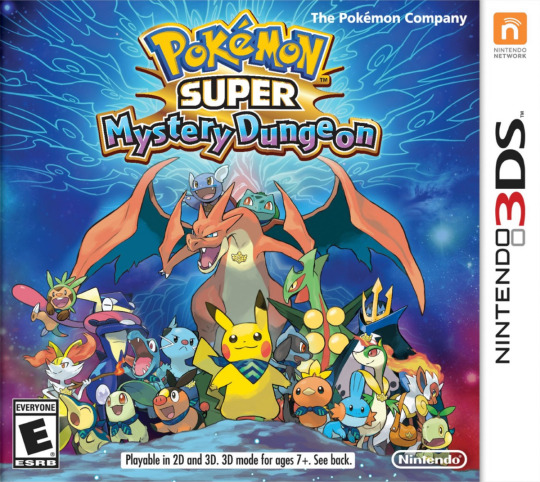
Well I’ve now beaten this game, and I have some thoughts about it, so chop chop Keara the story isn’t getting any younger I expect a full book report on my desk next Sunday.
Jokes aside, this was my first experience with a PMD game since Sky (discounting the demo for Gates to Infinity), and having missed the series’s third entry (fourth if you count those Japan-only WiiWare games), it’d be remiss of me not to at least mention that maybe some of the things I’m going to complain about were originally that game’s fault. But apparently that one actively sucks ass so who cares, just shift the blame over, eh?
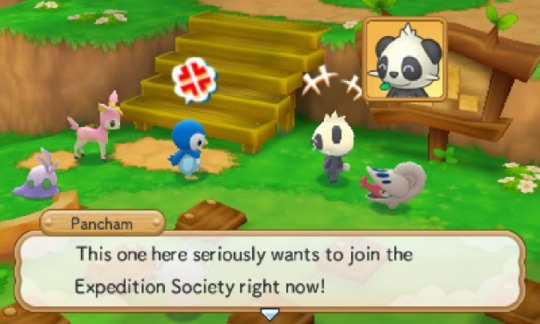
(ah, primary-school-tier bullying, exactly what I want in my Pokemon game, cool)
I think one of the foremost issues people have about PSMD is the story, and I can’t help but agree. The game spends what feels like forever fucking about in Serene Village, doing what could charitably described as tutorial followed by slice-of-life-ish plots, and while I love me a good slice-of-life anime, those tend to be a lot less slow than this. Also the characters tend to be a lot less one-note, but it’s a kids game, so whatever. Speaking of kids, this to my knowledge is the only PMD game where you and your partner character are canonically children, and spend a lot of time around others. The game seems to establish unevolved Pokemon as kids, which while it doesn’t really add up with the rest of the series (e.g. in the first ones, Caterpie is clearly a child, but Metapod is as well and Gulpin is at least adult enough to run their own store), it would ultimately be excusable if it didn’t make that huge section of the game so boring.
They aren’t consistent with that kids thing, by the way. When you finally reach the Expedition society, you’re met with a bunch of unevolved Pokemon (Archen, Buizel, Bunnelby, Swirlix) that are running around behaving very youthfully, who then turn around and go hey we don’t allow kids in our gang please leave. Like, the plot had been leading me to believe that the whole place was shut down, Ampharos as its final member, and those kids were just running around an abandoned building, but nope, here are your teammates for the rest of the game.
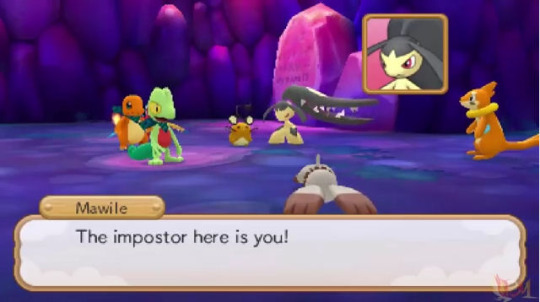
(brown sus)
The remainder of the plot is basically fine, its not like the plots in this series are the greatest on the planet (save maybe Explorers), though the focus on the villains turning people into stone felt pretty awkward. It’s like they wanted to pull off a more dramatic, more personal-stakesy plot but couldn’t actually kill anyone. This gets kind of egregious when you end up in actual hell for a bit, in what I guess is the series tradition of potentially traumatic experiences and blasted hellscapes being exposed to the protagonists. The endgame plot all seems to come at you at once, not helped by it being lots of chained dungeons without returning to towns beforehand- it wouldn’t be as bad if the whole game was like this, but with such a slow start, it just feels so inconsistent. The endgame twist was pretty spicy, I’ll admit, but it didn’t have enough buildup to feel earned in my honest opinion.
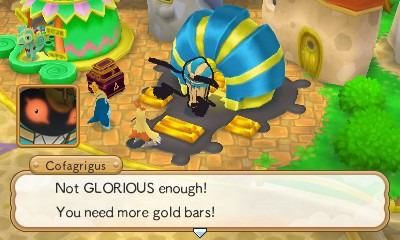
(pictured: the best character in the game)
But the plot doesn’t matter so much as the gameplay does it? And as someone who has also concurrently been playing through the first Pokemon Mystery Dungeon game on my GBA, there’s a lot of interesting comparisons to make. The dungeons on the whole are shorter in PSMD, with few of the main-game ones reaching beyond 10 floors (and not going much past it) compared to the prequels’ capping off with a 25+5 floor behemoth in Sky Tower. This is made up for by every floor of the dungeons in PSMD feeling much larger and more labyrinthine than anything in other PMD games, meaning each one takes much longer than you’d think. I dread to imagine what the 99-floor dungeons are like in this game, especially considering you now need an item to quicksave the game if you want to do anything else now. The dungeons themselves additionally really do not feel like they’ve taken advantage of the 9 years of potential design improvements and two console generations of technology improvements between games- it is frustratingly same-old same-old in the dungeon design.
These problems are capped off with the increased difficulty- that is, that every individual Pokemon is significantly more of a threat to you than in previous games, and you don’t really get the opportunity to level grind much. And I’m not opposed to difficulty in games, obviously, but what it does in PSMD is ruin the flow of the gameplay for me. What works in Mystery Dungeons previous was that blend of exploration and combat, and in Super, that gets completely broken up by protracted encounters with even the chump-tier mons you encounter along the way. Also, they made the basic attack complete shit, and I don’t like that.
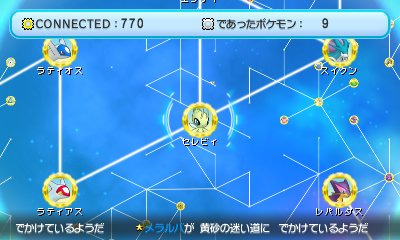
That’s not to say that the gameplay is all bad. I won’t comment too heavily on the Looplet/Emera system, because I’m kinda mid on it, but it didn’t help that despite all the game’s tutorialising I still didn’t get part of it until most of the way through the story. The game does have some moments of genuine brilliance in design, though. The way you recruit more Pokemon is so much better than the luck-based mission of the previous games, wihle managing to actually make you want to go on the random missions you get thrown throughout the game- for one thing they aren’t random, but it means you have a guaranteed good reward instead of the semi-RNG system where you just end up with a bunch of Gravelerocks and berries you’ll never use. In addition, the system where on non-plot days (and in the postgame) you just get 3 random Pokemon recommended to you, that get bonus EXP if you use them that day, is a great way of encouraging the player to diversify their Pokemon usage substantially, which is nice.
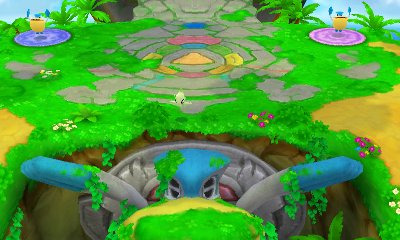
There’s a few other nice gameplay things I’d like to highlight. Considering the increased difficulty, the ability to rescue yourself (read: come back with the overpowered mons the game dropped in your lap) is really nice, especially since it’s not like anyone else is playing these games who can help. The way moves get better the more you use them is nice, especially considering how much more you use one move over and over in this game compared to main series Pokemon games. The random bonus missions and travelling mons you encounter in dungeons are nice, as well as the increased variety in missions available- as well as actually being able to revive fallen escortees, it makes the mission system overall much stronger than in previous entries.
Beyond that, though, I’m not sure what else I have to say about Super Mystery Dungeon. The game is a decent entry in what can barely be called a franchise these days, considering it’s 6 years old and yet still the newest entry, excluding the remake of the first ones that came out last year. It’d be a shame if this was the note we went out on for Pokemon Mystery Dungeon, but to be fair, I don’t think they’re ever going to be able to recapture the magic of the first two games. They struck gold with a lot of people, but I guess at this point, the gleam wore off.
4 notes
·
View notes
Text
Dumb little PSMD review thing, main story edition
Now that I’m done with the main game (for the second time) I thought I’d give some of my opinions on the game, at least pre-credits. Most of which I assume a lot of people agree with me on, but hey.
Story (Consider this your spoiler warning)
Differs from the average PMD story in that actually founding a team (and even meeting the partner) happens rather late. A lot of mysteries are opened right at the beginning, such as Deoxys commenting on Rayquazas unusual behavior, the Beheeyem showing up, and the obligatory man-character-is-human-and-also-has-amnesia trope, staple of the series. Unfortunately, the story picks up really slowly, despite it being very generous with dropping new chapter titles every few minutes. A lot of school (read: tutorial) stuff is hindering its flow, though with the new and different mechanics it’s somewhat understandable. This does mean that the villagers and school kids get plenty of time to establish their characters, something I feel was missing from the Expedition Society, with the exception of Ampharos. Nevertheless, their quirky personalities and hilarious writing make for a light-hearted, enjoyable story.
Then the “petrification arc” starts and shit gets intense. Characters show their serious sides, specifically Ampharos’ leadership qualities. The plot twist with Nuzleaf and Yveltal was pretty well done IMO, with Nuzleaf being established as the first ally in the game, and taking the children’s side multiple times throughout the early stages of the game, like when “defending” them from Carracosta or sneaking out with them against the rules of the other adults, who conveniently were mostly portrayed as stuffy buzzkills so players wouldn’t get as suspicious why going there was forbidden in the first place.
The appearance of the legendary beasts as characters is disappointing to frustrating though. First they let Krookodile do what he wants, then they let Nuzleaf do what he wants, then they let Yveltal do what he wants, then they blame it all on you. Their bevavior is explained, but not well. There’s ways of being cold and distant without being openly insulting. Maybe they just suck at socializing. Or acting. Or both.
Multiple layers of betrayal in the lategame keep the player on their toes. Both Beheeyem being honest about helping the player and Espurr actually being a double agent could be foreseen, but may as well have gone the other way. The various roles of the legendary Pokemon during the finale work great (and finally resolve the appearance of Deoxys and Rayquaza at the very beginning) and the final plot twist of the game, turning the usual player-needs-to-leave trope the series is known for on its head. I’ll chalk up the fact that it’s not as much of a tear-jerker than the previous titles to me being accustomed to it, as well as older.
(Also in the end, we didn’t get to see a Mega Ampharos/Mega Mawile moment. Bummer about that, might’ve been worth including in the Yveltal battle.)
Gameplay
PSMD’s gameplay is stellar and a vast improvement over Gates to Mediocrity. While it does keep plenty of elements from earlier titles, the changes made are enough for it to feel like a completely different game.
An overhaul of ranged attacks, with their range now varying beyond “melee” and “however long you want” as well as making them able to bypass allies to balance that, goes a long way to make the partner able to contribute more in battle, especially in hallways. It also places bigger significance on the order your team is walking in. Making the basic elemental moves 2-range was also important to avoid certain starters being straight-up better than others. Multi-hit and room-wide moves are still fucking overpowered and the bane of every player, though at least this time they can’t waste multiple Reviver Seeds.
Speaking of starters, the inclusion of choice egg moves in their movesets greatly differentiates them, which otherwise would be a lot harder since early on their learnsets are practically identical, and later their different evolutions aren’t present to differentiate them that way.
Changes to items, dungeons and enemies mean that the game plays surprisingly different than previous titles. Tougher enemies result in a need for more healing and higher HP, making Oran Berries even more invaluable than before, to the point where it’s not impossible to run out completely if one routinely eats one or two at the beginning of the dungeon, just for the HP boost. This higher pressure by enemies ties in nicely with the abundance of Reviver Seeds, now in different tiers, likely so Elixirs and Apples wouldn’t become completely redundant. Shorter dungeons overall fit the harsher belly meter and prevent the game from becoming too stale with the longer battles, the default partner AI is now more than just a mirror of the player’s movements (to the point of incorporating things other installments needed IQ skills for, like not stepping on a fucking trap) and pushing is great. The ability to leave certain party members behind without wasting Reviver Seeds on them (even the partner if you want to!) is also helpful, and Looplets bring a nice dynamic to held items as well.
Unfortunately, the story progress is incredibly linear, to the point of being frustratingly so. A concrete list of requests to finish rather than the usual random ones sounds great, and it’s something I do like about the game, but when the game forces you into the next story dungeon with no way to clean out those requests and get them done so they don’t silently taunt you from the menu, it gets annoying. Even just picking up a reward at Cafe Connection has to wait when the game decides that you want to do story now. For a game about exploration, this is unacceptable.
Somewhat related to this issue is the fact that pretty much every partner Pokemon you ever team up with outlevels you greatly. You and your partner are the weakest Pokemon on the planet, and you get carried by literally everyone else around you. A fact that you can’t do anything about since, you guessed it, grinding isn’t something the game allows you to do. This also more than likely causes you to be underleveled for the final dungeons and getting oneshotted a lot, which no matter how many million Reviver Seeds the game throws at you is frustrating nonetheless. I do appreciate the fact that the game gives you ways to take out pretty much anything using the right wands.
Difficulty wise, I’d locate this game at the top of the Pokemon Mystery Dungeon series, at least when talking about the main storyline. Though it stands to argue that bad luck can easily put Red and Blue Rescue Team in the top spots. The difficulty in PSMD is a lot more fair compared to that, in that it gives you ways to overcome it more easily.
Overall, the game does have its flaws, though most of them come from the limitations of the main story. I’m definitely looking forward to how the postgame plays, as that’s new ground for me as well.
1 note
·
View note
Text
Rescue Team Retrospective Part 8: Characterization, Part 5
Hero
Much to my surprise, they actually do have more spoken dialogue than I remember. However, most of it still seems to be when they are/think they are alone, when they are dreaming, or during dialogue tree options. They also have funnier dialogue options on the whole, compared to in Explorers. …And I honestly don’t remember how much they have in PSMD, but I feel like it still less than they had in Gates?
Anyways, I get the feeling that they’re a bit older than most of the other protagonists, mostly in terms of what little dialogue we do see and how their situation seems a bit more dire in general? They are more prone to speculating on their new nature as a pokemon, for one, and they seem a bit more active over all in actually trying to figure out what exactly happened to them. Possibly this is because they actually get some hints early one with Alakazam suggesting they go check out the Hill of the Ancients, compared to Explorers waiting until the expedition and then pretty much stumbling into a possibility with Uxie, PSMD not really seeming to touch on it until way, way late in the game, and Gates actually having some knowledge of what they’re there for, but then deciding not to bother finding out anything else despite having the clearest path.
The Rescue Team Hero has the smallest support group and the natural disasters they keep experiencing first hand, even within the town, make their situation the most dangerous from the get-go, but they rise to the challenge admirably. And also, no one questions the fact that they are choosing to live alone even though we do have multiple examples of parents with children present in the Square—which is another reason why I think they must be older, because otherwise I would hope one of the actual adults would question it. So I’d give them late teens at minimum.
We don’t really get too much of a backstory on them besides the fact that they apparently spoke with Gardevoir and suggested the memory wiping themselves as a test of their worthiness. I think that the implication might also be that they are actually from the pokemon world specifically, rather than pulled there like the Gates hero was, but it isn’t entirely clear from the dialogue exactly how far the “We” that Gardevoir spoke of could reach on their search for a savior, so it could really go either way. I personally headcanon them as coming from the human world, though.
Of all the different heroes, I still think they have the least actual characterization—though they definitely do have more of it than I previously remembered.
Partner
I’m going to note again that I am just going with the original version. I know that DX changed some stuff—especially when it comes to the post game interactions—but since I haven’t played that version, I can’t comment on it.
The Partner actually seemed a lot sassier and selfish than I remember them being. Like, sure, I did recall that line about them faking a stomachache before they go off to save Shiftry, but even before that… well, they make fun of the hero’s name, for one, and they seem a bit self-centered and glory seeking when it comes to receiving personal rescue requests. Like… I touched on it a little in the Gengar post, but their reaction to the mail stealing scene struck me a bit differently as an adult than it did when I was a child. They weren’t angry that someone was stealing from their friend’s mailbox—they were angry that they weren’t the ones who would be getting the credit for completing the rescue requests. And maybe I’m just being nit-picky about it, but the subtle difference there just strikes me as putting the partner in a bit more negative light.
That aside, their devotion to the hero is clear. They are a great friend and go to many lengths to help them figure out their identity. And I actually think their moment of doubt after hearing the Ninetales Legend for the first time actually serves to strengthen their emotion and conviction. They really did go ride or die from the hero—knowing all the risks and having only their friendship as a reason to follow them on the fugitive arc. Comparatively, the Explorers partner literally was just dragged along with no say in the matter, the Gates partner thought it was just going to be a standard rescue mission when they agreed to help, and the PSMD partner was really the one who seemed to be calling the shots for the most part (and also accidentally got dragged along to their fugitive arc equivalent much like the Gates hero did, since their initial assumption was that the mission was going to be different than what ended up happening).
This is why I felt—and still feel—very betrayed by the fact that they pretty much abandon the hero after the main storyline. And they can even kick you out of your actual house if you choose them to be the leader. Okay, so the way that they frame it is to suggest taking a divide and conquer approach—that you can make teams specifically suited to each quest—but its just really sad that they no longer follow you around anymore or get any special dialogue if you visit their friend area.
I don’t think their goals and desires are as clear cut as some of the other partners. They seem to be almost making things up as they go at some points. Yes, there is an early indication and justification for wanting to form a Rescue Team initially, but they don’t really seem to get too into the idea of what that actually means until Caterpie expresses an interest in one day joining and the partner then suggests one day creating a proper base. And then promptly says nothing else on the matter or tries to get that started at any point between then and the fugitive arc until they randomly bring it up after meeting the mankey gang. Like, sure, some of that was put on the backburner when they got that suggestion to see Xatu… but there was still a little time before that, and there was ample opportunity for them to have had some sort of dialogue option indicating that they were still interested in doing that, but were going to put it aside in deference to the hero’s needs.
From that point of view, their bond with the hero probably is a lot stronger from the beginning. Which is in some ways good, but in other ways bad since it means we don’t get to see as much relationship growth. Though, ironically, I think we do see more growth from this pair in that matter than we do from the Explorers pair, especially considering the “moment of doubt” scene.
Like, sure, the Explorers duo are excellent friends, and obviously they are extremely close considering the whole Dimensional Scream thing. But while we do see some individual growth from the partner, there aren’t too many overt examples. Sure, we get that montage before the credits… but its just a lot more subtle. And that actually speaks more to the sort of easy friendships of young children, which is another reason that I headcanon that pair as being so young—which makes it all the sweeter that the duo can stand the test of time and remain close even after the big adventure is over.
That being said, I still think that the Rescue Team pair has less relationship growth than Gates or PSMD does. Which is probably one of the few nice things I can say about PSMD—I really do like how they handled the partner’s character growth there… it’s just too bad that a lot of the time it came at the expense of the hero, in multiple ways.
So I guess my overall verdict on the Rescue Team partner is that they aren’t as flat of a character as I remember, they’re still lacking in personal growth overall and are probably the overall weakest partner of the series even though there are some aspects in which they excel.
As a final note… Interestingly enough, it really is only the Gates and Rescue Team partners who really get the chance to make a deliberate choice to put the hero’s desires before their own—though it is slightly more subtle in the Rescue Team partner’s case. Sure, unlike the Gates partner, the Rescue Team partner doesn’t ever have the opportunity to actually ask the hero to stay with them—the hero didn’t tell them they would have to leave and then came back on their own anyways fairly quickly, and though the partner did question once whether or not they wanted to turn into a human again, they didn’t really comment much either way and the subject was quickly dropped. But it was the Rescue Team partner who worked through a moment of doubt and resolved to trust their hero, and, again, they did not have to go on the run with the hero. The hero outright offered to disband the team and give them the chance to leave, and they refused.
This is much like the subtle way that the Gates partner showed they cared. True, they didn’t exactly take back their words to the hero about wanting them to stay—at least not beyond what they said in the goodbye frism—but they were very willing to pass up on the opportunity to wish for their return if it meant the hero would be happier on Earth, and they tried their hardest to give them the best of both world when they did finally make a wish.
In comparison, the question was never really brought up with the Explorers partner, and they didn’t really have a choice or opportunity either way. And the PSMD partner didn’t give the hero any chances or opportunities at all, period—only some of which can be explained on the fact that apparently they also had their own case of amnesia, because even then they weren’t trying all that hard to look into the hero’s situation before that point when they, at least, actually got the opportunity to have an actual life and childhood full of new memories with their guardian and didn’t actually realize they had changed species at all, unlike the hero who knew full well from the get-go that they had amnesia and weren’t supposed to be a pokemon at all.
2 notes
·
View notes
Text
Still not quite finished with Gates, but I’m nearing the finish line for the main game? I think? So I have some more structured thoughts below.
(Apologies for the length, but... well, that’s part of why I’m putting it under the cut)
Most of the mechanics I think are an improvement on Explorers—and definitely on Rescue Team, since Explorers introduced a lot of improvements (like the way healing items are handled—in Rescue team you had to throw them at your allies, and only the hero could eat them directly from the bag). I like how Gates handles experience for allies left at home, and the way that you can level up individual moves and share them among everyone rather than using a ginseng on a single move for a single pokemon (that I don’t think retains that level up if you forget it but then go and remember it again? I can’t recall that part), and some of the team skills are useful… but the problem is that they are really luck-based in terms of actually acquiring them. I’ve only gotten two so far. Comparatively, IQ skills were very much based on the individual, but also a lot easier to get, allowing for a sort of customization aspect? It allowed more care and a better sense of victory, at least.
The V-wave thing is pretty cool, though, especially when paired with how exp works, even as annoying as I find Victini.
Getting rid of the hunger mechanic is I think positive overall? It does free up some inventory space, which is nice, but it also removes a bit of the puzzle and challenge for some of the longer dungeons—and I can’t help but wonder if the reason they did so is just because of how many dungeon layouts in Gates were comprised of many, many sprawling hallways with tons of intersections and small, unnecessary turns and corners, but only, like, three rooms—meaning that everyone would starve to death if the hunger system was involved. I know Explorers had some of those, too, but those were mainly for later stage dungeons, where bigger challenges were expected. It also makes a lot of the dungeons… really boring and repetitive? Like, the graphics are great, but there isn’t really too much variety of the non-plot dungeons beyond differences in color schemes? And while the puzzles involved are excellent, there aren’t really a lot of them, and so far Inflora Forest is the only one where the puzzle is still relevant after making it through the first time—the other ones seem to keep the bridges and stairs you make the first time around, leaving those sections rather superfluous.
And while I like how Companion mode lets me have more of a casual sort of playstyle, and I can build up Paradise and do mini-games without interference from the plot… It kind of makes Post Town really unnecessary beyond specified plot scenes? Like… I don’t have to wait to open any Treasure boxes. Once a dungeon ends I get instant gratification of finding out what’s in them (assuming I have enough money). Same thing with the gold bars. And since Quagsire operates as a shop as well, there is really no need for Kecleon (in Post Town—the ones in the dungeon are still extremely useful) beyond maybe him having some rarer items on occasion—but even then, getting certain shops in Paradise also makes him even more redundant.
(Though, speaking of Paradise shops: Elite boutique—not worth it. Maybe if all shops operated that way—were only around for a specific period of time before inevitably closing—it would be less grating… but there was no warning that that shop would only be run for a few days before closing forever, in addition to the fact that I have to watch Gurdurr’s sad face and laments about destroying the place [after a big part of his backstory involved someone deliberately destroying his work, mind you!] when they could have easily solved it as running more like the travelling salesmon in post town—you never know who or when someone will show up, or how long they’ll stay, but the possibility is at least there that someone will show up again.)
I also don’t like how you can’t stack missions—it really takes the emphasis off of the actual “exploring dungeons” part of the game, and puts it more on trying to build up Paradise. Which is fine, but it just doesn’t feel like traditional gameplay for a PMD game, you know?
As far as characterizations goes… It’s honestly kind of a mixed bag for me in comparison with some of the other games? Like… I do think that, overall, your immediate team and allies had better characterization visible in story, following the plot. As in, they came right out and showed you in the cutscenes, and didn’t depend on you going and talking to them individually in town, reading their diaries, and playing special episodes. I don’t think that the partner is the absolute best-characterized one writing-wise, but they were very, very well-done and do show good growth throughout (Rescue Team is the worst, mostly because of how bland they actually are—especially in the Post Game, where they are completely optional, and no longer follow you around or really talk to you at all like an individual character, rather than just another pokemon you recruit from dungeons [and on that note—I’m kind of sad that Gates got rid of the feature that actually let you talk to your team in the dungeons themselves. Sure, most of what got said was the same ten or so bland lines for everyone, but… I still liked having that option to just turn around and discuss things, especially since at some points it was unique based on where in the plot you were!)
But at the same time… that does take a little mystery out of it? Like… it makes your own (the actual, physical player’s) relationship with them a bit… less rewarding? You aren’t actually working at forming them, this way, the way you would be if you were exploring the town, happened across someone from the guild, and then decided to talk with them. That way, learning all these cool little hints and quirks was almost like a puzzle itself, something you had to work for, something that really embraced the idea of exploring and immersion.
Which is also kind of why I’m of two minds about the fact that the hero does actually have scripted lines, beyond just their thoughts and the little “running motion” indicative of things being said, but not actually described. There aren’t as many dialogue trees, you don’t really get to make that many choices, and the lack of space left up to the imagination… well, it doesn’t make me resonate with the hero as much as in other cases? I don’t really feel like they’re “me,” or could be “me,” so while they do feel in-character for the “character” of the hero… it just doesn’t feel like I’m actually the hero. It doesn’t leave space for that option the way that the other games do.
As for other characters… honestly, it’s kind of hit and miss for them as far as characterization goes, and I think a lot of that has to do with my earlier remarks about how unnecessary Post Town feels most of the time. I feel like they were really over-ambitious with their ensemble cast? Because, sure, some of them like Leaveanny, Swadloon, Lillipup, and Herdier I thought were well done… most of the others were rather forgettable? There were some travelers like Trubbish, Mienfoo and Dwebble that I really like, but I think that most of the others just don’t get enough characterization. Sure, it’s nice that a lot of them care about the player and greet them as their own individual, clearly trying to convey that relationships are being formed… but I just don’t care that much for the town as a whole? The others don’t really grab me, or add that much to the plot at all? Especially since half the time bigger plot discussions only really happen with the group in Paradise?
Like… Explorers had a lot of people, but the fact that they did travel in and out of town, and would sometimes go missing for days, but clearly had their own little stories and plots they were following was really interesting! Same with Rescue Team—the Pokémon Square was small, but it actually felt like a lived-in town? And I’m pretty sure the main towns of PSMD that you were actually using as a hub had that too—Serene Village definitely did. But Gates… I just don’t really see it. They were too ambitious, and they fell flat. I feel like maybe they could have fixed this if you were allowed to visit it in Companion Mode, too—or if they just didn’t let you visit any non-Paradise shops and only allowed Quagsire to edit your party—or if they shrunk it down so that the only thing there was Swanna’s place and the hill, and had the individual characters visit on a basis similar to Explorers, but… yeah.
As far as plot/story goes… well, some of that is hard to determine, just because of how much is involved in a good story. Characterization, like I said, is fine overall, but the story does seem really… low stakes? For the most part? Especially when compared to Rescue Team or Explorers. I think it has good progression over all—especially when compared to the mess that was PSMD!—but there isn’t quite as much of an overall… driving force? I think?
Like… okay, I know I’ve said before that it is a little weird that the hero in Explorers—and I guess also in Rescue Team—spends so much time focusing on other stuff rather than figuring out exactly what happened to them, why they turned into a pokemon, why they have amnesia, etc. (especially since that is part of their stated reason for joining the Guild in Explorers), but in all fairness… what else are they really supposed to do? They have amnesia, they have no clues as to a starting place to even look, it makes sense that they would want and need a safe place and routine figured out so that they can even start looking. And there are some hints pretty early on about their backstory/the state of the world (in dreams and dimensional screams). But the Gates hero… well they actually do have something of a starting place, and they have far more reason to really care about figuring all that out. For one thing, they do not have amnesia. The game makes that pretty clear, and the partner even makes comments on that—asking about friends and family, etc.
So why aren’t they making more of an effort to figure out how to get back home so they can actually reunite with those loved ones?? Or at least commenting on why they might not be concerned about that?? And since the hero doesn’t have amnesia, they also clearly remember the fact that they were called to the pokemon world specifically because someone was asking them for help—and they had a visual description of who they assumed that someone to be. They have a starting point. Why are they not asking around about that?? Why did they wait for more dreams to happen first? And, while it did get brough up in game a little bit, with them commenting on how maybe it wasn’t the greatest idea for them to be taking one of the spots on that initial Great Glacier Expedition because they do, actually, have some responsibility they’re supposed to fulfill, and they don’t know if they’ll have more dreams on the way… they still go on that expedition! Without bringing any of that up verbally, or to the partner who has by that point already agreed that they will go with the hero to save that pokemon as soon as their dreams clear up more.
But… like… they shouldn’t just be being so passive about this??? There are things they could all be doing to prepare! And maybe that is getting into some different facets of the partner’s personality, and showing how really dependent they are on the player—like, having their reluctance to do more be because of how much they really don’t want them to leave after (which does get brought up a little bit)… but I don’t think that’s quite what the game was going for—and if it was, then that needed to be made clearer.
So I guess over all… I think that Explorers is a better game to play if you do want something more story/plot driven, and want to, well, explore things a bit, while Gates is better for a more casual sort of play. Like… the actual plot almost seems like the side story or Special Episode in the face of building up Paradise.
Though, that probably does say more about an individual’s playstyle over the game itself, huh?
I guess… if you’re more into direct characterization via cutscenes, Gates is better (though there are times I wish it showed more of the visuals—like for some of the party scenes, or the housebuilding scene). But if you want a more integrated plot, Explorers is better—or Rescue Team, but it doesn’t have as good of a post-game).
And PSMD… well, I still stand by my earlier statements that I think the first part of the game was great, and the partner was the best-explored/characterized of them all… but it quickly lost plot cohesion and most of the adult characters are terrible people who should not be allowed around children—and the player character really got screwed over by basically everyone and never got closure for any it.
(Also, I can’t actually say anything about DX, since I don’t have a Switch, but from what I’ve seen it’s basically just Rescue Team with some improvements to gameplay mechanics? The story seemed to be pretty much the same from what little I saw.
Oh, and also Ekans’ sprite looks very, very weird.)
...I think that’s everything I had to say for now.
#pokemon mystery dungeon#explorers of sky#explorers of time/darkness#red/blue rescue team#gates to infinity#super#dx#spoilers
3 notes
·
View notes
Text
I started replaying Sky again for the umpteenth time (nostalgia after playing Gates, you know? I guess I could played my new-ish copy of Blue Rescue Team… but I honestly didn’t feel like dealing with the awful item or recruitment mechanics at the moment). My current hero is a mudkip with a shinx partner named Noah.
In all fairness—I did get Bulbasaur on the personality quiz at first, but I don’t really want to play as them. Not that I think bulbasuar is a bad choice or anything—it’s mostly because I didn’t like the expression photos available for Bulbasaur in Rescue Team and had some bad memories playing as them there.
Still! I was a mudkip the first time I played through Time, so there is a lot of nostalgia there. And I do seem to reliably pull either mudkip, treecko, eevee, or bulbasaur in these quizzes, which is interesting.
Also Squirtle in PSMD, but I can’t remember exactly what that quiz breakdown is and how they assigned the personalities given the new pokemon they added—I know that changed from game to game (even among Time/Darkness and Sky, for that matter)
I probably won’t be doing any liveblogging of this playthrough, because I’ve already said a lot about this game over the years, but who knows? Maybe I’ll discover something new.
Actually—I did actually find something interesting when I was finishing up my last play (because apparently last time I’d made it to the Scizor post-game mission and then had to stop for some reason? So I just decided to finish through the Darkrai fight before starting again). You know how I was talking about the dialogue differences for the Hero in Gates vs. other games? It turns out that the hero in Sky actually does talk out loud a bit more in the post game… but the interesting thing is that they don’t tend to do it when others are in earshot. Like… when Darkrai first contacts them in his Cresselia disguise, they actually talk to him—but, then again, since that is literally all in their head via the fact that they’re dreaming, does it even count as “talking?” Given the mechanics of dreams, they might not really be able to hide their thoughts or anything. Then immediately when they wake up they monologue for a little bit and wonder what just happened, noticing that their partner is still asleep—and that part is out loud. But… again, there aren’t really any witnesses to that, since as far as they know their partner is still unconscious. And we already know with things like the dialogue trees that they are somewhat more open in general with their partner than anyone else.
The hero is also the ones that call out the visitor’s species in the sentry duty mini-games, as well, but I think I’ve pointed that out before.
0 notes